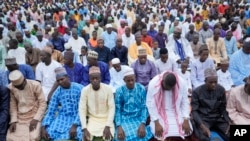Non-believers in northern Nigeria said they have been perennially treated as second-class citizens in the deeply religious African nation.
The Nigerian Humanist Association, a rights group focused on ethics and values in the West African nation and is run by Leo Igwe, the founder, reported struggling with unprecedented threats to its members.
Their members have gone underground and are no longer holding meetings, the group said.
But a small group of members met in Lagos to talk with the Associated Press, AP.
Igwe said he feels atheism is treated as taboo and often demonized due to their social upbringing in Nigeria.
"People preach against it," Igwe said.
"You are made to understand that it's something evil and you know it is always difficult for people to kind of break away from their socialization. It takes a lot of courage. It takes a lot of intellectual courage," he added.
Olawande Odukoya, an atheist that publicly disclosed his religious beliefs said "There was a time where a lot of people called a family meeting. They were like, you know, I put on my social media about my religious beliefs, and they were like, Oh, what if some people try to attack you."
"They just put the fear in me," Odukoya added.
AP, spoke to seven nonbelievers to document their experiences. Most spoke anonymously and in secret locations over concerns for their safety.
An anonymous atheist from Gashua, a community in Nigeria's northeastern region said "It has not been easy. I have faced a lot of challenges."
"One of them is people can't really understand the fact that an entire human being, will just wake up and say he or she doesn't believe in God," the atheist added.
When he was young, the atheist from Gashua was sent to the madrassa, or Islamic school.
He said many of his classmates felt changed after learning of the tawheed, or the attributes of Allah and his oneness, but he did not.
"I can say that I have been an atheist all my life," the atheist said.
"In 2017, I came across a piece of writing that addressed the topic of existence and nonexistence of Allah and any other God, in a just way. And I feel connected to the texts, in a way that I have never felt connected to any story I was told about the existence of God," he added.
In 2019, the man said he was forced from his home when his uncle found out he belonged to an atheist group on WhatsApp, prompting death threats. He returned home after pretending to be a practicing Muslim even though he remained a closeted atheist.
"My biggest fear as an atheist living in northern Nigeria is this, I don't want to get known to be an atheist and get killed or lynched in the street," he said.
In Nigeria's northern Kano State, a young man said he became an atheist after reading a Facebook post made by Bala.
"Since the conviction of Mubarak Bala, whenever I am in the midst of people that know me, and it is time for prayer, I will just go and pray with them. Not because I believe in the religion of Islam, but for my safety and the safety of my family," said the atheist from Kano State.
Bala is imprisoned in the northern state of Kano. He remains resolute as a humanist despite his experiences since his arrest in April 2020.
Despite his firm position, the humanist said he worries about the safety of his family and that of his counterparts.
Nigeria with a population of approximately 210 million people, is almost evenly divided between Christians — dominant in the south — and Muslims who are the majority in the north.







Forum